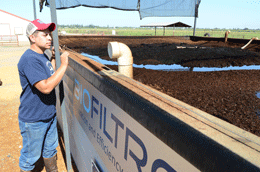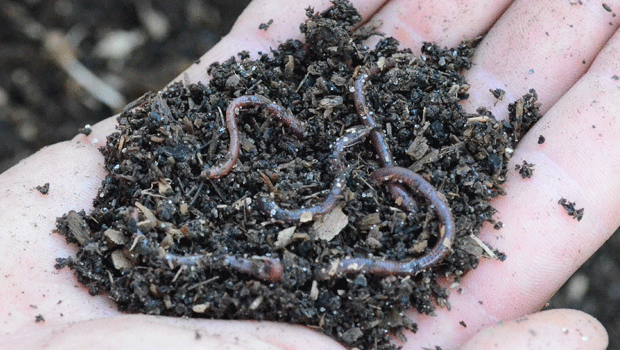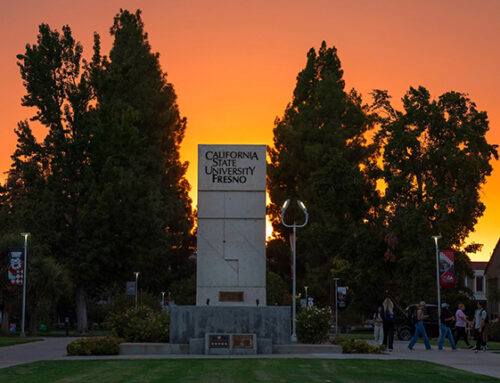Fresno State water technology and animal science specialists are eyeing earthworms as a means to enhance water efficiency on the university dairy.
It’s all about biofiltration — the use of natural organisms rather than chemical processes to recycle water — in a new partnership with a Chile-based wastewater treatment company, Biofiltro USA Inc., to test the innovative method.
Fresno State is a test site for a system that could fundamentally change approaches toward water treatment while saving energy and eliminating chemical usage.
Earthworms will serve to filter unwanted nutrients out of the dairy’s wastewater, explains Sanjar Taromi, chief marketing officer for Biofiltro USA, which recently opened an office at Fresno State’s Water and Energy Technology (WET) Center.
The recycled water can then be used in a greater variety of irrigation applications.
“Our company has developed and patented a sustainable and environmentally friendly technology for the treatment of domestic and industrial wastewater at low cost,” Taromi said.
“In the case of a dairy’s wastewater, prior to recycling, it was only available for flood irrigation. Recycling through our system allows the option of more efficient water use technologies, such as sprinkler or drip systems.”
Taromi describes Biofiltro’s patented technology as relatively simple: the filtering system features a bottom layer of gravel with space for aeration and water percolation, covered by a bed of wood shavings loaded with California red worms.
Wastewater is sprinkled at intervals over the worm beds. The worms thrive in the moist environment, consuming the solids in the liquid waste. The bacterial micro flora in the worm castings consume and metabolize nitrates, phosphorus, oils, fats and other compounds.
Treatment is completed in four hours. The water percolating through is collected for reuse.
“It is not potable (safe to drink), but having been cleaned of solids and other unwanted  organic compounds, it is available for a broader range of agricultural uses,” Taromi said. “In this sense, it does save water, because before all you could do was flood a land area and sometimes not grow anything. Now the recycled water is available for more applications.”
organic compounds, it is available for a broader range of agricultural uses,” Taromi said. “In this sense, it does save water, because before all you could do was flood a land area and sometimes not grow anything. Now the recycled water is available for more applications.”
Dr. Jon Robison, a Fresno State animal science professor who oversees the university’s commercial dairy, welcomed the proposal made by Biofiltro last year to build a pilot-scale filtration unit on some unused ground adjacent to the dairy (northwest corner of Barstow and Chestnut avenues). He secured the blessing of University Agricultural Laboratory administrators to partner with Biofiltro to test the process.
Robison said “it’s a very good concept” because the process takes both the good and the bad of the dairy waste stream and recycles them for useful purposes.
“There are nutrients that are beneficial to the ecosystem, and there are some compounds that are detrimental, such as nitrates and salts,” Robison said.
But he’s not yet sure about the commercial application relative to a larger-scale operation. The filtering unit at the university dairy is relatively small (20 by 30 square square) and processes only a fraction of the waste stream.
“The key is in testing the process,” Robison said. “Here’s an opportunity to discover some things that we didn’t know about. This could be a breakthrough, as we have the opportunity to learn some things for the entire industry. The challenge is in adapting this to a full-scale commercial operation.”
While Biofiltro is new to California and the United States, it is in full operation internationally, with more than 100 installations in Chile, Brazil, Mexico, Spain and New Zealand. The recycling technology has also been applied to wineries, food and meat processors, municipalities and a hotel and casino.
“Biofiltro has the potential to fundamentally change biological approaches toward water treatment,” Taromi said, adding that Biofiltro plans to build its first commercial system in California at a dairy in Hilmar this year. “Unlike conventional water treatment facilities, Biofiltro uses no chemicals — the system is all natural and it’s very low in energy use, as essentially the only power used is to pump water through the system.”
Robison said the Fresno State pilot project will be reviewed after one year to determine whether the campus system could be expanded.
(Copy by Steve Olson, publications editor for the California Agricultural Technology Institute).
Related links:





